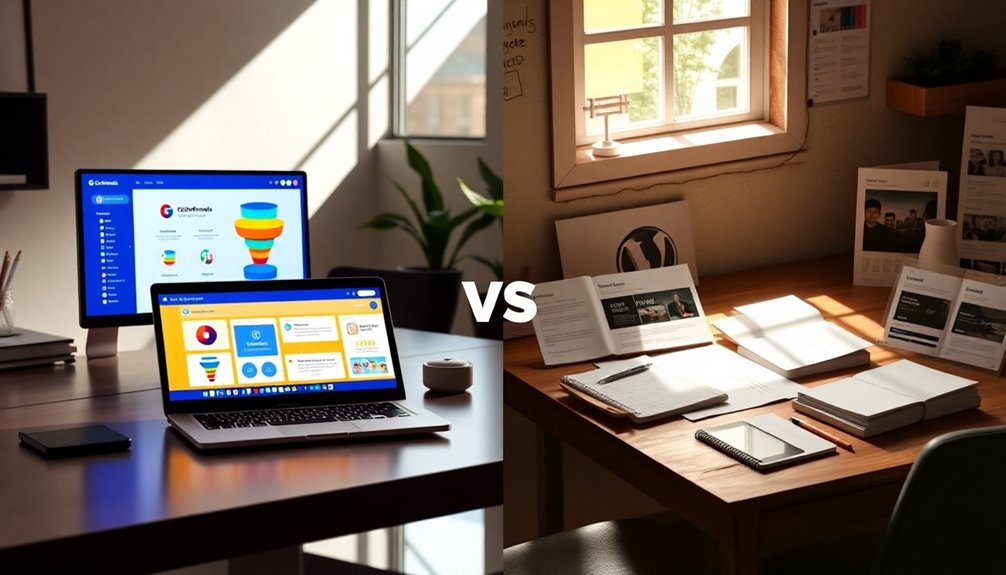When choosing between ClickFunnels and WordPress, think about your business needs. ClickFunnels is great for quick sales funnels with its user-friendly drag-and-drop interface, making it ideal for beginners. However, it comes at a higher monthly cost. On the other hand, WordPress offers extensive customization and is more budget-friendly long-term, but it has a steeper learning curve. If you need tailored solutions and greater control, WordPress might be your best bet. Ultimately, your choice hinges on whether you prioritize simplicity or flexibility. Keep exploring to uncover how each platform aligns with your specific business goals.
Pricing Comparison
When considering the pricing for ClickFunnels and WordPress, you'll notice a significant difference in their cost structures.
ClickFunnels offers three pricing plans: Basic at $147/month, Pro at $197/month, and Funnel Hacker at $297/month. This adds up to an annual cost of about $1,524 for the Basic plan.
In contrast, WordPress can be set up for free, but you might spend between $400 to $1,200 yearly on hosting and premium themes. Regular backups are essential for ensuring your data is safe, as backup plugins can help protect against data loss. Additionally, using plugins like UpdraftPlus can enhance your backup strategy with customizable options for regular data protection.
While ClickFunnels provides an all-in-one solution, its costs can escalate quickly.
For those with technical expertise, WordPress often emerges as the more budget-friendly option, delivering greater long-term value with lower annual costs and one-time fees for premium themes and essential plugins. Additionally, implementing regular backups for data safety is crucial for protecting your WordPress site from potential data loss.
Cost Breakdown for WordPress
Building a WordPress website can be surprisingly affordable, especially when you consider the flexibility it offers.
The cost breakdown for a small-business website typically ranges from $2,000 to $9,000, with annual maintenance costs falling between $400 and $1,200. Regular updates and security measures are essential to ensure the site's safety and performance, including the use of trusted backup plugins like BackupBuddy that enhance data protection.
While WordPress itself is free, don't forget about domain registration, which averages around $20 a year, and hosting that can cost anywhere from $5 to $75 monthly.
Premium themes might set you back under $300, while essential plugins like Gravity Forms and WPRocket usually have annual fees around $59 each. Additionally, investing in managed WordPress hosting can greatly enhance your site's performance and security.
Cost Breakdown for ClickFunnels

When considering ClickFunnels, you'll find three main pricing plans: Basic at $147/month, Pro at $197/month, and Funnel Hacker at $297/month. Each plan offers different features, which can impact your long-term costs based on your business needs. Plus, with a 14-day free trial, you can test it out before committing to a subscription. Additionally, if you're looking for a more budget-friendly option, consider exploring lightweight WordPress themes that can effectively support your blogging efforts. Many of these themes, such as Astra, provide excellent customization options and performance at a fraction of the cost. It's important to note that performance optimization is crucial for user satisfaction and can influence your choice of platform.
Pricing Plans Overview
Choosing the right pricing plan for ClickFunnels can greatly impact your business's bottom line, especially since it offers three distinct options tailored to different needs.
Here's a quick overview of the pricing plans:
- Basic Plan – $147/month: Allows one website and up to 20 funnels. Ideal for small businesses just starting out.
- Pro Plan – $197/month: Expands to 100 funnels, five admin users, and three domains, perfect for growing businesses needing more features.
- Funnel Hacker – $297/month: Includes unlimited funnels and advanced analytics, catering to larger or more complex marketing needs.
While ClickFunnels positions itself as an all-in-one solution that may save costs on multiple tools, it's important to weigh these subscription costs against what you might spend on WordPress and other tools.
Long-term Cost Implications
While ClickFunnels can streamline your marketing efforts, its long-term cost implications are significant and deserve careful consideration.
With pricing plans starting at $147/month, you'll face annual costs of about $1,524 for the Basic plan. If you need advanced features, the Pro and Funnel Hacker plans can escalate to $2,364 and $3,564 annually, respectively.
Although ClickFunnels offers an all-in-one solution that may save on multiple tools, these costs can add up quickly.
In contrast, WordPress tends to be more budget-friendly, with setup costs ranging from $2,000 to $9,000 and annual expenses between $400 and $1,200.
Plus, WordPress allows for customizable options through free software and premium themes, making it a potentially less expensive long-term solution.
Ease of Use
When it comes to ease of use, ClickFunnels shines with its intuitive drag-and-drop interface, perfect for beginners.
On the other hand, WordPress presents a steeper learning curve, especially if you're not familiar with web hosting and plugins. Additionally, understanding the WordPress installation process can greatly enhance your confidence in managing your website effectively. Ensuring your server meets WordPress requirements will also contribute to a smoother experience while using the platform. Furthermore, selecting the right hosting provider can significantly impact your overall experience with WordPress.
Understanding these differences can help you choose the right platform for your business needs.
User-Friendly Interfaces
How easy is it to create effective sales funnels? When you evaluate user-friendly interfaces, ClickFunnels stands out with its intuitive drag-and-drop functionality, making it perfect for those without much technical knowledge.
On the other hand, WordPress offers extensive customization options but requires more effort in setup, particularly concerning hosting and plugins.
Here are three key aspects to assess:
- ClickFunnels provides customizable templates and prebuilt funnels for quick deployment, streamlining your sales process.
- WordPress offers over 50,000 plugins and numerous themes, giving you control but demanding more management.
- Ease of use in ClickFunnels is designed for funnel creation, while WordPress can be more complex for beginners.
In essence, ClickFunnels simplifies your sales journey.
Learning Curve Differences
Although both ClickFunnels and WordPress serve business needs, their learning curves differ considerably.
ClickFunnels features an intuitive drag-and-drop interface, making it easy for you to create sales funnels without any technical skills. With pre-designed templates, you can get started quickly, allowing you to focus on your business rather than the setup process.
In contrast, WordPress offers vast flexibility with thousands of themes and over 50,000 plugins, but this comes at a cost. You'll need some knowledge of hosting, plugins, and possibly coding, making the learning curve steeper.
While ClickFunnels might limit advanced customization options for experienced users, WordPress requires more effort to master its extensive capabilities, making it a more complex choice.
Setup Complexity Comparison
The differences in setup complexity between ClickFunnels and WordPress are significant and can greatly impact your experience.
- ClickFunnels offers an intuitive interface, allowing you to create sales funnels quickly with pre-designed templates—ideal for users without technical skills.
- In contrast, WordPress requires plugin installation, knowledge of hosting, and sometimes coding, which can complicate your initial setup.
- While you can launch a funnel on ClickFunnels in hours, building a fully functional eCommerce site on WordPress might take days or weeks, depending on your desired customization options.
Customization Options

When it comes to customization options, ClickFunnels and WordPress cater to different needs and skill levels.
ClickFunnels offers limited customization options, focusing on pre-designed funnel templates and a drag-and-drop editor. This makes it easy for you to create sales pages without needing extensive technical knowledge.
However, if you're looking for advanced modifications, WordPress provides extensive customization capabilities. With thousands of themes and over 50,000 plugins, you can achieve personalized designs and functionalities tailored to your business. Additionally, using SEO plugins can significantly improve your site's visibility and performance. Regularly updating your content can also enhance site activity, which is crucial for maintaining search engine rankings.
While ClickFunnels excels in funnel design, WordPress is the more versatile platform for thorough website customization. If you have the technical expertise, WordPress lets you create unique layouts and features beyond standard offerings, making it ideal for long-term goals. Additionally, utilizing SEO optimization plugins can further enhance your site's visibility and overall performance.
Security Features
When it comes to security, your responsibilities differ markedly between WordPress and ClickFunnels.
With WordPress, you need to take charge of implementing security measures, like managing plugins and staying up-to-date with updates.
In contrast, ClickFunnels offers built-in security features, making it easier for you to protect your data and transactions.
Self-Hosted Security Responsibilities
While self-hosted WordPress gives you flexibility and control, it also places the onus of security squarely on your shoulders.
You need to implement critical security measures to protect your site from cyber threats. Here are three key responsibilities you must manage:
- Regular Updates: Keep your WordPress core, themes, and customizable plugins updated to minimize vulnerabilities.
- Data Backups: Regularly back up your data to guarantee you can recover your site in case of a breach.
- Security Audits: Conduct frequent security audits to identify potential weaknesses and areas for improvement.
Unlike ClickFunnels, which offers built-in security features like SSL encryption, you'll need to actively configure these protections yourself to safeguard your self-hosted site.
Built-In Security Measures
Security is a crucial aspect of any online business, and with ClickFunnels, you get built-in measures that simplify this responsibility.
As a SaaS platform, ClickFunnels provides essential security features like SSL encryption and two-factor authentication to protect user data and guarantee secure transactions.
On the other hand, WordPress requires you to implement your own security measures. You'll need to rely on various plugins for malware scanning, firewalls, and regular updates to manage vulnerabilities effectively.
While WordPress allows for extensive customization through these security plugins, it demands vigilance to avoid potential threats from outdated themes and plugins.
With ClickFunnels, you can focus on your business while it handles the heavy lifting of security.
Plugin Vulnerability Management
Although managing plugin vulnerabilities can seem intimidating, it's essential for maintaining a secure WordPress site.
With the right approach, you can greatly enhance your WordPress security. Here are three key steps to take into account:
- Regular Updates: Always keep your plugins and themes updated to patch vulnerabilities and reduce the risk of malware.
- Security Plugins: Utilize tools like Sucuri or Wordfence for malware scanning and firewall protection, boosting your site's defenses.
- Two-Factor Authentication: Implement this feature to add an extra layer of security to your login process.
In contrast, ClickFunnels security features, including SSL encryption and built-in security management, streamline the process.
This allows you to focus less on plugin vulnerability management and more on your business.
Publishing Tools

When it comes to publishing tools, WordPress stands out with its intuitive content management system (CMS) that offers a rich editor and numerous formatting options.
You can easily schedule posts and integrate with analytics tools like Google Analytics to track your website's performance. WordPress offers extensive customization possibilities through its themes and plugins, enhancing your publishing capabilities with SEO tools and social media sharing options.
On the other hand, ClickFunnels provides limited publishing tools focused on sales funnel creation. Although it recently introduced a Blog feature, it still primarily relies on templates designed for lead generation and sales conversion.
While ClickFunnels includes built-in analytics tools for funnel performance, WordPress gives you greater flexibility and control over your content.
Ecommerce Capabilities
Ecommerce capabilities play an essential role in choosing the right platform for your business. When evaluating ClickFunnels and WordPress, consider these key factors:
1. Customization: WordPress, with WooCommerce, offers extensive Customization options for your online stores, allowing you to tailor every detail to fit your brand.
ClickFunnels has built-in eCommerce functionality but limits your customization.
2. Payment Options: While ClickFunnels mainly supports Stripe and PayPal, WordPress provides a broader selection of Payment Options through various plugins.
3. Sales Funnels: ClickFunnels excels in creating streamlined Sales Funnels, making it easier to convert interest into purchases, whereas WordPress requires extra configuration for similar functionalities.
Ultimately, your choice should reflect your eCommerce needs and growth ambitions.
Key Considerations

As you weigh your options between ClickFunnels and WordPress, it's important to contemplate your specific business needs and long-term goals.
One key consideration is whether you need a sales funnel builder or a customizable website. ClickFunnels excels with its user-friendly interface, making it easy to create funnels focused on conversion optimization.
On the other hand, WordPress offers extensive customization options with thousands of plugins and themes, making it a more cost-effective choice for tailored designs.
While ClickFunnels provides an all-in-one solution, its ongoing costs may be higher.
Ultimately, aligning your platform choice with your long-term business goals will help you decide which option suits your needs best: ClickFunnels vs WordPress.
Overview of WordPress
WordPress stands as the most popular content management system (CMS) in the world, powering about 43.5% of all websites. It offers a versatile platform for users like you, with two primary versions to choose from:
- WordPress.org – self-hosted for extensive customization.
- WordPress.com – fully hosted with limited control.
With nearly 60,000 plugins available, you can tailor functionality and design to meet your needs.
As an open-source platform, WordPress benefits from a global community of developers who facilitate continuous improvements and regular updates.
Plus, its robust SEO capabilities help optimize your content for better search engine rankings.
Whether you seek flexibility or ease of use, WordPress has the tools to support your business effectively.
Overview of ClickFunnels

If you're looking to streamline your sales process, ClickFunnels offers a compelling alternative to WordPress. This all-in-one marketing platform focuses on creating high-converting sales funnels, making it perfect for entrepreneurs and marketers.
With a user-friendly drag-and-drop editor, you can quickly build customized sales funnels using pre-designed templates—no technical skills required. ClickFunnels operates on a subscription model with three pricing plans, providing varying levels of funnel access and features to suit your needs.
The recent ClickFunnels 2.0 also includes integrated CRM, email marketing tools, and advanced A/B testing capabilities to optimize your funnel performance.
Plus, with a strong community of over 270,000 members, you'll have plenty of support and resources to enhance your funnel-building experience.
Pros and Cons
When considering ClickFunnels and WordPress for your business, it's essential to weigh their respective pros and cons.
- ClickFunnels Pros: Offers an intuitive drag-and-drop interface and pre-designed templates, making sales funnel creation easy for non-technical users.
- ClickFunnels Cons: The subscription model starts at $147/month, which can be costly over time, especially for startups.
- WordPress Pros: Delivers extensive customization options through thousands of themes and over 50,000 plugins, often at a lower cost.
However, WordPress Cons include a steeper learning curve, requiring technical knowledge for setup and maintenance.
In a cost comparison, while ClickFunnels can accumulate costs quickly, WordPress generally provides a more budget-friendly option for those who can navigate its learning curve.
Making the Right Choice

Choosing the right platform for your business can greatly impact your online success. If your focus is on creating effective sales funnels quickly, ClickFunnels offers a user-friendly interface designed specifically for that purpose.
However, if you prefer extensive customization and a more versatile approach, WordPress could be your best bet, especially with its thousands of themes and plugins.
While ClickFunnels might come with higher subscription costs, WordPress can be more cost-effective in the long run.
Consider your long-term business goals—WordPress provides sustainability and ownership, while ClickFunnels may deliver immediate results for targeted campaigns.
Make an informed decision based on your needs to guarantee your online business thrives.
Conclusion
So, you've weighed ClickFunnels against WordPress like a contestant on a game show, right? Sure, one's a sleek Ferrari and the other a trusty old pickup. But let's be real—if you're in it for the long haul, that pickup might haul more than just flashy sales pages. Remember, it's not just about shiny features; it's about sustainability and the ability to actually keep your business running when the glitz fades. Choose wisely!



